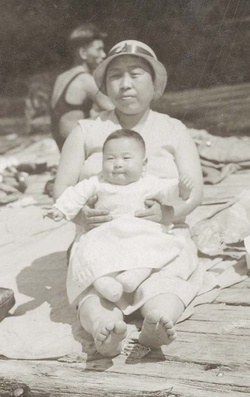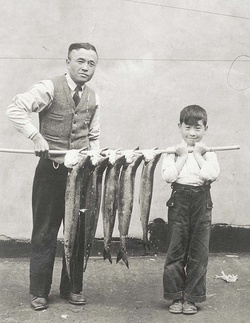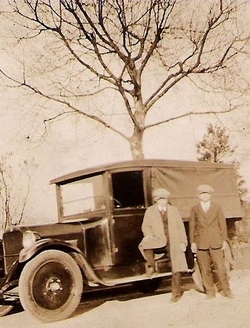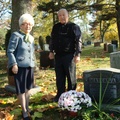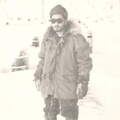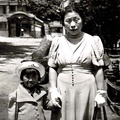Read Part 2 >>
Frank Is Born
I was a nine-pound baby when I was born and every time Mom went to J-Town she told me that she would go to the ladies’ communal bath place wherever that was and all the ladies would whisk me away from her and marveled at how fat I was and nicknamed me “Kin Taro-san” (“Golden Boy”).
She was always blaming me for her stretched out belly so I told her that she shouldn’t have eaten so much! She told me that she couldn’t speak English when she first came over but learned how to say one pound baloney so literally we had teriyaki baloney with rice every day for quite some time. I replied to her, “No wonder you and I became fat,” ha, ha, ha.
Yes, that Japanese baloney was good cooked or raw and so good that it was laid out next to the sliced kamaboko, ebi, kanten, etc. during the New Year festive celebrations. It was about 2 inches in diameter and was made by Germans, probably, but we took credit for it as nobody but us cooked it as a teriyaki baloney—so good with rice!
Another tasty dish was fried potatoes with chopped onions, green pepper, and lots of pork sausages. We used to douse it with shoyu and ketchup and ate it with rice—what a starchy combination, but it was so good and that’s all that mattered! (I thought that it was only a Vancouver dish but when I was courting Susan in Toronto, her sister, Waki was cooking that too for her kids to my surprise and they were from Vancouver Island.)
Mom always had special foods prepared for Dad and I was the only one that enjoyed it as well, lucky me! Raw oysters with su-joyu, various caviars, abalone, various sashimis, kazunoko, clams—all went well with rice—yummy! Dad and I ate tasty tempura smelts (uncleaned with head still on, guts and bones still in) and nobody else would even touch it! I just enjoyed anything. We even ate salted fish intestines called “shiokara” with rice.
When my father was born at home they thought that he was dead as he wasn’t breathing, so they put him in a basket and left him out in the porch. Later they heard a cry! My sisters and I wouldn’t be here today if he hadn’t cried.
I didn’t know my father as well as my Mom earlier in life as he was the breadwinner and was at work most of the time. He did take Sundays off though and we did things together. Believe it or not, we used to go skating on Lost Lagoon Pond at Stanley Park in the winter as it froze over in the winter. Dad and Tokio-san took me golfing too and I even had my own clubs.
But fishing was his passion and he took me trout fishing along the Fraser River areas (his brother, Sadakichi-san was a crazy fisherman too so we frequently went together). Sadakichi-san had a Buick and father drove a Pontiac. Sadakichi-san drove so fast he would pass us in no time always and would already be fishing by the time we got to the destination. He was like a race car driver!
Sadakichi-san was a good companion to Dad and whenever he came over to our house Dad always had a bottle of Johnny Walker Black Label whiskey ready for him as it was his brother’s favourite.
I can also remember trolling for various salmon along Horseshoe Bay and we had good catches. Even along the shores near Second Narrows Gate Bridge nearby we went fishing for shinna pochi (shiners) and got pails full. I used to like them barbequed and in soup.
I remember Dad wanted to buy a second hand boat with a cabin and we went looking all over along the shorelines but that dream was squashed as the war started.
Working at Maikawa Shoten
Apparently Tomekichi-san had plans to build a few more stores in the future, thus the plural for store(s). He was very ambitious! I can’t remember too many things when I was four or earlier. It was a two-story building selling the usual Canadian and Japanese goods: family clothing, shoes, toys, candies, Japanese foods too, etc. As you enter the store, after the clothing displays there was quite a large office for all the managers and bookkeepers on the bottom floor at the rear left side.
My father, Bungoro Maikawa, and uncle (ojichan) Hane Oue managed the main and second floor which was arranged like a department store and they did all the planning and obtained all the goods they needed from the wholesalers in Vancouver and Japan to stock up and sell. I’m not certain what Tokio-san did but I am assuming that he was part of what they were doing too. They all did their share of PR for the Japanese community.
As for the other employees, I don’t remember too much as I didn’t have much face to face contact but I remember Dad and Hayashi-san had very high regards for Masuko Iguchi and Pat Adachi as they were always praising them. Some that I had contact with, I can’t remember their names anymore.
Towards the rear on the right side there was a huge enclosed packing area, Japanese bulk food stuff, and loading docks. Across the alley was another building which looked like a warehouse and even a rice polishing machine with a conveyer belt starting from the rice with husk on until the polished rice was bagged. A couple of employees were living on the second floor of the warehouse and they showed me their quarters. There were many trucks and sales-drivers taking orders and delivering the foodstuff, clothing, etc. which was ongoing in and out continuously.
They covered all the areas wherever Japanese Canadians were working in mining and lumbering to fishery industries in B.C. from Vancouver area to Vancouver Island and as far up north as Prince Rupert. I still remember some names of the places they went to like Steveston, Woodfiber, Nanaimo, Cumberland, Chemainus, Port Alberni, Powell River, etc. The drivers gathered and loaded all their orders and samples to show for their trip. From what I heard, the drivers mainly stayed over with families that the store made arrangements with and not in hotels like present days.
When the war started all the vehicles were impounded by the government but I’m not certain what happened to business trucks. Mr. Hayashi managed this area and was in charge of ordering all the bulk food stuff from Japan (shoyu, miso, takuwan, umeboshi, cases of canned goods, dried packaged foods, etc.) and kept the warehouse stocked.
Although Hayashi-san never admitted it to anyone, being a very humble person but being the most senior and respected person, I think he was really the overall main leader of the management team.
Respecting Your Elders
As for showing respect to elders, it was an old Japanese traditional way of teaching for the oldest one to always be a good role model and the younger ones to follow and Mr. Hayashi was just that so had the respect. I can attest to that as I saw it all the while he was around us. Even my mother made Amy call me “ni-chan” and would correct her always if Amy called me by name (and here I knew that I wasn’t a good role model but it made me try at least, so I guess that’s the main reason behind this tradition/culture).
I’ve never seen my father address his brother as Tomekichi and always called him “ni-san” whenever he visited us from Japan. Tokio-san and Sadao-san (another Maikawa from the fish store side) were father’s nephews but they were more like Dad’s little brothers and had special close relations and ties together and they called Dad, Bun-chan. Dad called them Tokio and Sadao as he was older.
Everybody worked in harmony with each other like brothers (even if they were non-blood related) and I didn’t notice any friction at all. Everybody close called my father “Bun-chan”. Anybody listening would notice that they were close without being told. There’s more to it with this old Japanese traditional value system that meets the present day eyes of our children who might think what I’m saying doesn’t make sense in this present age.
© 2013 Frank Maikawa


